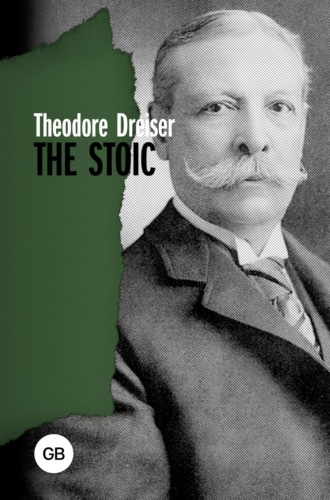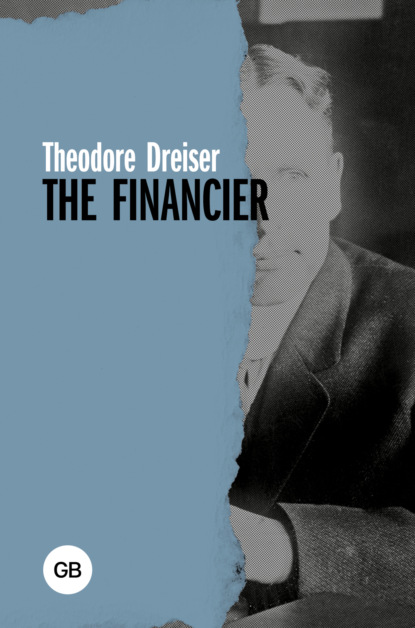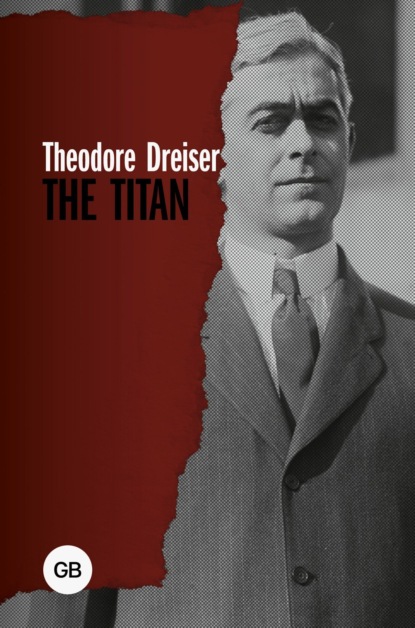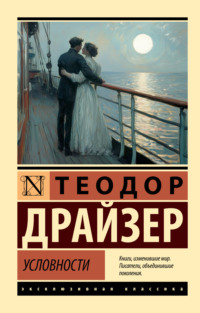
Полная версия
The Stoic / Стоик
Well, no, they could not do that, exactly, but if they failed, they might be willing to take something less than 50 per cent, say 30 or 35, provided they were permitted to retain their contract to construct.
Cowperwood smiled again at this point.
“What interests me, gentlemen,” he went on, “is that you who appear to understand the engineering business thoroughly should assume the business of financing to be less difficult. For it isn’t, of course. Just as you have had to study for years, and then by practical work get to the place where your reputations would command such contracts as I knew you are accustomed to, so I, as a financier, have had to do exactly the same thing. And, of course, you cannot expect any man, however great his wealth, to step forward and agree to construct and operate a road as large as this out of his own pocket. He couldn’t do it. It would be too great a risk. He would have to do what you are planning to do: get other people to invest. And he would not raise money for any enterprise without first a profit for himself, and, second, a profit for those whose money he was using. And in order to do that he must have much more than a 50 per cent interest in anything he undertakes.”
Greaves and Henshaw were silent, and he went on talking.
“Now, you are not only asking me to raise the money, or most of it, while I make it possible for you to raise the rest, but to pay you to construct the line and then afterward operate it jointly with you. If that is what is really in your minds, of course we need not talk any further, for I am not interested. What I might do would be to take over your £30,000 option, provided it gave me full control of the road, and possibly leave you the £10,000 you have paid in and your contract to build, but not more than that. For in addition to all this, as I know, there are £60,000 of consols, carrying interest at 4 per cent, which have to be looked after.”
Jarkins and Randolph were beginning to feel by now that they had in some way mishandled all of this. At the same time, Greaves and Henshaw, sensing that they had overreached themselves in a situation where they might have profited, gazed at each other dubiously.
“Very well,” said Greaves, finally. “You are your own best judge, Mr. Cowperwood. But we want you to understand clearly that there isn’t a sounder proposition in the world. London is the ideal field for undergrounds. It has no united system, and lines like this are absolutely necessary, and will come. The money will be found for them.”
“Possibly,” said Cowperwood, “but as for myself, if after again looking over the situation you still find yourselves unable to work out your plan and are willing to accept mine, you may say so in writing, and I will then consider it. However, if I decide to become interested, it would have to be with an option to close on my own terms. That, of course, would not mean that I would disturb you in the matter of your construction contract. That could stand, I think, provided your specifications were satisfactory.”
He drummed on his desk with his fingers as if to indicate that the interview was over, and then paused to add that since there was no proposition before him now that he could consider, he would take it as a favor if no publicity of any kind resulted from what he had said. Then he signaled Jarkins to remain, and the moment the others had gone, turned to him and said:
“The trouble with you, Jarkins, is that you never completely grasp an opportunity even when it’s in your hands. Look what’s happened here today! You bring me two men, who, according to your story and theirs, control an important traction proposition in London, which, if rightly handled, might readily lead to much larger things for everyone concerned. Yet they come here with no conception of the way I do business. You know what that is: full control for myself. I doubt if even now they have any clear knowledge of my experience in this field and what I could do with such a project. They thought they could sell me a half-interest in something which they and their friends would control. I tell you, Jarkins,” and here he glared with a finality which sent chills up and down the spine of Mr. Jarkins, “if you’re to be of any service to me in this matter, I would advise you not to bother with this particular proposition but to look into the entire London underground situation and see what can be done with that. And furthermore, I want you to keep all of your private speculations in regard to me and my affairs to yourself. If you had gone to London before bringing these men to me, and ascertained all there was to know about them, you would not have wasted my time and theirs.”
“Yes, sir,” said Jarkins, who was fat and forty, a very model of sartorial excellence, and, at the moment, because of nervousness, wet with perspiration. He was a flabby, waxlike man, with black, acquisitive eyes, below which a small, pointed nose stuck out, and below that a soft, puffy mouth. He was forever dreaming of some speculative coup which would make him a multimillionaire, and a well-known figure at first nights at the theater, polo games, dog shows, and other society functions. In London he had as many friends as he had in New York.
In consequence, Cowperwood had the feeling that he might have some use for him, and yet, at the moment, he was not willing to do more than throw out vague hints, knowing that they would, in all probability, cause him to go tearing after Greaves and Henshaw to set himself right with them, and, who knows, he might even go over to London, where… well, what better press agent could he have than Mr. Jarkins?
Chapter 15
And true enough, it was not many days after Greaves and Henshaw had departed for London that Jarkins also sailed, all aquiver with the expectation of becoming a part of an enormous adventure which might lead to those dreamed-of millions.
And while this preliminary move in connection with Greaves and Henshaw and their Charing Cross line appeared to have ended less definitely than Cowperwood had hoped, it made no change in his determination to proceed. For there was the information provided by Sippens, and because of that he was determined to get control of some underground line, if not the Charing Cross. And so there were not only consultations, but a number of dinners at his home, from which latter Aileen took the impression that her husband was at least a little interested in the old life which had made her early days in Chicago with him her most colorful and happy memory. She was beginning to wonder whether, by some strange turn of fate, the Chicago failure might not have sobered him, so that he had decided to accept, if not necessarily relish, the old-time outward relationship, which, little as it meant to him, could still be so comforting to her.
But the truth was that Cowperwood was becoming more and more intrigued by the temperament of Berenice. There was about her a certain playful and inventive whimsy, which, combined with her practical as well as poetic and rhapsodic moods, delighted him. In fact, he was never weary of studying her, and in the comparatively short period since she had arrived in Chicago, he had come to experience and relish the equivalent of a mental fever in regard to her.
One of Berenice’s fancies, and one which had affected Cowperwood most profoundly, had occurred more recently in Chicago. One late afternoon they had driven out for dinner to the inn where they had dined a couple of evenings previously. But before entering, she had led him to the nearby woods, where in a snow-flecked patch of scrub oak and pine stood a snow figure in his own image, part caricature and part an arresting likeness. She had driven out alone early that very morning and shaped it. For the eyes she had used two bright gray-blue stones, and for the mouth and nose, small pine cones of different sizes. She had even brought out one of his hats and placed it jauntily atop the snowman’s head, thus serving to emphasize the likeness. Suddenly confronted with this figure at dusk, a wintry wind whispering among the trees and the last rays of a blood-red sun spearing through, Cowperwood was startled.
“Why, Bevy! Of all the odd things to do! When did you do this, you pixie?” And he laughed at the touch of the comic, for she had placed one eye the least bit askew, and the nose was a little exaggerated.
“I did it this morning. I drove out here alone and made my lovely snowman!”
“It does look like me, by Jove!” he said, amazedly. “But, Bevy, how long did it take you to do it?”
“Oh, perhaps an hour,” and she stepped back and eyed it appraisingly. Then, taking his cane from him, she placed it against one of the snowman’s pockets, which were indicated by small stones. “Now, see how perfect you are! All snow and cones and stone buttons!” and she reached up and kissed the mouth.
“Bevy! If you’re going to do that, come here!” and he seized her in his arms, feeling that there was something here that was eerie, elfin. “Berenice, dear, I swear you puzzle me. Have I a real flesh-and-blood girl, or a sprite, a witch?”
“Didn’t you know?” and she turned and spread out her fingers at him. “I’m a witch, and I can turn you into snow and ice,” and she came eerily toward him.
“Berenice, for heaven’s sake! What nonsense! Sometimes I think you are the one who is bewitched. But you may witch me all you care to, only don’t leave me,” and he kissed her and held her tight in his arms.
But she drew away and turned back to the snowman. “There, now!” she exclaimed, “you’ve gone and spoiled it all. He’s not real, after all, darling. And I made him so real. He was so big and cold, and needed me so much out here. And now I’ll have to destroy him, my poor snowman, so that no one will have ever truly known him but me.” And all of a sudden she dashed the figure apart with Cowperwood’s cane. “See, I made you, and now I’m unmaking you!” And as she talked she powdered the snow through her gloved fingers, while he gazed at her wonderingly.
“Come, come, Bevy, sweet. What are you saying? And as for making and unmaking, do both, but don’t leave me. You are taking me into strange places, new and strange moods, a wonder world of your own, and I am happy to go. Do you believe that?”
“Of course, dear, of course,” she now replied as brightly and as differently as though no such scene as this had ever been. “It’s meant to be so. It must be.” And she slipped her arm under his. She appeared to have come out of some trance or illusion of her own, concerning which he would have liked to question her, but he felt that he should not. Yet, and more at this moment than ever before, there was that about her which thrilled him, as he realized that he could come and see and touch her, without let or hindrance, and that now, as never before, he was allowed to walk and talk and be with her. This was the substance quite, of all real earthly good and delight. Truly, he would never wish to part from her, for never before had he encountered anyone so varied, so different, so reasoning and practical and yet at the same time so unreal and whimsical as this. Histrionic, yes, and yet the most resourceful and colorful of all the women he had known!
And on the purely sensual side, there was something about her which from the beginning not only surprised but enticed him. She refused to permit herself either to be lost in or wholly ravished by the male. No mere commonplace fleshly instrument for the satisfaction of the lust of himself or any other was she. On the contrary, and always, however amorous or fevered she might be, still she was quite definitely conscious of her charms: the swirl of her red-gold hair about her face, the magnetism and implication of her inciting and compelling blue eyes, the sweetness of her mouth, with its enchanting and enigmatic smile.
Indeed, as he thought after the most shaking and reducing transports with her, hers was never a mere gross and savage lust, but a glorified and intense awareness and evaluation of her own beauty, enforcing its claims by the art of suggestion and thereby producing an effect that was different from any he had ever known. For it was not Berenice but himself who was most ravished mentally and sensually, indeed all but submerged in her own exotic consciousness of what this relationship implied.
Chapter 16
Realizing that it would be necessary for him to cooperate with Tollifer, at least in some small way, in order to bring about effective results in regard to Aileen, Cowperwood decided that he would inform her of his planned trip to London in a few weeks’ time, suggesting that if she chose to she might accompany him. And he would notify Tollifer to this effect, making plain to him that he would be expected to entertain her so that she would not be torturing herself with her husband’s neglect as she had in the past. His mood at the time was one of the best. After the long period of tragic emotional cleavage between them, he felt that at last he was about to adjust matters in such a way as would ease her sufferings and bring about at least a semblance of peace.
At sight of him—ruddy, assured, genial, a gardenia in his lapel, grey hat, grey gloves, and swinging a cane—Aileen was compelled to restrain herself in order not to smile more pleasantly than she felt he deserved. At once he began to talk of his affairs. Had she noticed from the papers that one of his bitterest enemies in Chicago had recently died? Well, that was the end of that worry! What were they going to have for dinner? He would like Adrian to prepare some sole Marguéry, if it wasn’t too late. By the way, he had been very busy; he had been to Boston and to Baltimore, and shortly he must go to Chicago. But this London matter… he had been looking into that, and probably, very shortly, he would be going over there. How would she like to go along? Of course, he would be very busy while there, but she could run over to Paris, or Biarritz, and he might meet her week ends.
Whereupon Aileen, taken aback by this new development, leaned forward in her chair, her eyes alight with pleasure. Then catching herself, remembering her true relationship to this husband of hers, she sank back again. There had been too many subterfuges on his part for her to be sure of anything. Nevertheless, she decided it was best to assume that this invitation meant a genuine desire for her company.
“Fine! Do you really want me?” she asked.
“Would I be asking you, dear, if I didn’t? Of course, I want you. This is a serious move for me. It may prove a success, and it may not. Anyway,” and here he lied with his usual bland utilitarianism—a stab in the very vitals of love—“you were with me at the beginning of my other two adventures, and I think you should come in on this one, don’t you?”
“Yes, Frank, I would like to be in on it, if you feel that way. It would be wonderful. I’ll be ready whenever you decide to go. When do we sail—what boat?”
“I’ll have Jamieson find out, and let you know,” he said, referring to his personal secretary.
She walked to the door and rang for Carr to give him the order for dinner, her whole being suddenly revivified. A touch of the old life, this seemed, wherein she had been a part of both power and efficiency. She also ordered Carr to get out the luggage and report on its condition.
And then Cowperwood, expressing concern for the health of the tropical birds he had imported for his conservatory, suggested that they go and look at them. Aileen, now in a most cheerful mood, walked briskly beside him, watching him as he studied the two alert troupials from the Orinoco, and attempted by whistling to induce the male to utter his pellucid cry. Suddenly he turned to Aileen, and said:
“As you know, Aileen, I’ve always planned to make this house into a really fine museum. I keep buying these things, and eventually it should be one of the finest private collections. And I’ve been thinking a lot lately about how to arrange with you so that when I pass on, as I will, sooner or later, it will be kept, not so much as a memorial to me, but as a pleasure for people who care for things like this. I’m going to draw up a new will, and that’s one of the things I want to consider.”
Aileen was a little puzzled by all this. What did it mean?
“I’ll soon be sixty,” he went on, quietly, “and while I’m not thinking of dying just yet, I certainly feel that I ought to clear matters up. As three of my five executors, I’ve been intending to name Mr. Dolan, of Philadelphia, and Mr. Cole, as well as the Central Trust Company here. Both Dolan and Cole are men who understand the financial and executive side of things, and I’m sure they would carry out my wishes. But since I intend leaving you the use of this house for your lifetime, I’ve been thinking of joining you up with Dolan and Cole, so that you can either open the house to the public yourself or see that arrangements are made to do so. I want the house to be beautiful, and remain beautiful after I die.”
Aileen was now even more thrilled. She could not imagine what had brought about this serious consideration of herself in connection with her husband’s affairs, but she was flattered and gratified. It must be that he was beginning to take a more sobered view of life.
“You know, Frank,” she said, trying not to be too emotional, “how I’ve always felt about everything in connection with you. I’ve never had any other real life, and never want to have any, apart from you, although you don’t seem to feel that way any more. But as far as this house is concerned, if you leave it to me or make me one of your executors, you can rest assured that nothing will ever be changed by me. I never pretended to have the taste and knowledge that you have, but you know that your wishes will always be sacred to me.”
While she talked, Cowperwood was poking his finger at a green and orange macaw, whose harsh voice, harmonizing with his brazen colors, seemed to mock at the solemnity of his mood. Yet he was touched by Aileen’s words, and reached over and patted her on the shoulder.
“I know that, Aileen. I only wish the two of us could look at life from the same standpoint. But since we cannot, I want to make the best of all possible compromises, because I know that whatever has been or may be, you care for me and are likely to continue to do so. And whether you believe it or not, if I can make any return for that, I am only too anxious to do it. This matter of the house, and some other things I am going to talk to you about presently, are a part of it.”
At the dinner table later, he told her of his idea of endowing a hospital with extensive research facilities, and spoke of other bequests. In this connection, he indicated how necessary it would be for him to make frequent returns to New York and to this house. And on such occasions he would prefer her to be there. Of course, there would be intermittent trips abroad for her, too.
And seeing her so happy and satisfied, he congratulated himself on the manner in which he had brought her around to his terms. If only they could continue that way, all would be well.
Chapter 17
In London at this time Jarkins was busily engaged in impressing his partner, Kloorfain, with the news that the great Cowperwood, he believed, was really interested in the London underground situation as a whole! He described Cowperwood’s attitude and words, and at the same time he explained that they had made a mistake in not sensing that a man with such immense holdings would certainly not want to bother with one little underground system. How ridiculous for Greaves and Henshaw to think they could interest him in 50 per cent of their line! Why, here was no chance of him accepting any such terms. Nothing short of a full 51 per cent control for him! Did Kloorfain think that Greaves and Henshaw were ever likely to find the money for their line in England?
To which Kloorfain, a stout, oleaginous Dutchman, as shrewd in small practical ways as he was deficient in large financial vision or courage, replied:
“Not at all! Too many ‘acts,’ as it is. Too many companies fighting each other for single routes. No willingness on the part of any one company to join up with any other to give the public a through route at a reasonable fare. I’ve seen it myself, for I’ve been riding around London for years. Why, just think, there are these two central lines, the Metropolitan and the District, which together control a circle around the very business heart of London”… and he proceeded to point out some of the practical as well as financial errors made by these two lines, and their resulting difficulties. They had never been willing to merge and build feeder lines, not even to electrify and modernize those they had. They were still running steam engines through tunnels and open cuts. The only company which had shown any sense at all was the City and South London, which ran from the Monument to Clapham Common. It had an electric system which operated with a third rail, and it ran smoothly, was well lighted, and the only well-patronized road in the city. But even so, it was too short; its passengers had to transfer and pay an extra fare on the London loop. London certainly needed a man like Cowperwood or a group of English financiers who would get together and finance and enlarge the system.
As to proposed lines which Cowperwood might secure, well, there was the Baker Street and Waterloo, being promoted by a Londoner by the name of Abington Scarr. Scarr had had his act for the last sixteen months and done nothing. Then there was some talk of extensions being made by the District, but in both cases capital was wanting.
“In fact,” concluded Kloorfain, “if Cowperwood really wants that Charing Cross, I don’t think he’d have much trouble getting it. Traffic Electrical gave up trying to finance it over two years ago. Since then these two engineers have had it, but until this suggestion in regard to Cowperwood came up, I’m sure they never had a bid of any kind. Besides, they’re not railroad men, and unless they find a man with as much money as Cowperwood has, I doubt if they’ll ever be able to put it through.”
“Well, then, there’s no use worrying about them, is there?” commented Jarkins.
“I think not,” reiterated Kloorfain. “But I think we ought to look up some of the people connected with the two old central loop lines, the District and the Metropolitan, or some of the bankers down in Threadneedle Street, and see what we can find out. You know Crawshaw, of Crawshaw and Vokes. They’ve been trying to find money for Greaves and Henshaw ever since they took over the option. Of course, they’ve failed, just as the Traffic Electrical crowd failed before them. They want too much.”
“Traffic Electrical?” queried Jarkins. “That’s the company that had this line originally. What sort of people are they?”
At once, and quite briskly, Kloorfain recalled a number of things in connection with them, not all that Sippens had discovered, but enough to interest both men. For now, emerging out of the pool of Kloorfain’s memories came Stane, Rider, Bullock, and Johnson, but more particularly Johnson and Stane. They had been among the principal promoters of Charing Cross and Kampstead, Stane was of the nobility and a large stockholder in District as well as City and South London. Johnson was counsel for Stane, as well as for District and Metropolitan, and also a stockholder in both lines.
Well, why not try and see this man Johnson?” queried Jarkins, all ears and attention because of his rift with Cowperwood. “He must be pretty well informed on all that’s going on.”
Kloorfain was standing at a window, looking down into the street. “Capital!” he exclaimed, turning around to face Jarkins. “The very idea! Why not? Only…” And now he paused and looked dubiously at Jarkins. “Is this all quite ethical? As I understand it, we haven’t the right to say we represent Cowperwood. From what you say he only agreed to hear Greaves and Henshaw in New York because we asked him to. He didn’t appoint us to do any work in connection with them.”
“Well, anyhow, I think it might be a good thing to sound out this fellow Johnson,” returned Jarkins, “indicate to him that Cowperwood, or some American millionaire that he know, is interested in a plan to unite some of these lines, and then suggest that the Charing Cross line, if they could get it back, might be sold to him. In that case, as the agents bringing them together, we ought to come in for a pretty neat bonus, and we’d be entitled to it. Besides, if any shares can be picked up now or sold for them or Cowperwood, we might come in as purchasing or selling agents. Why not?”












